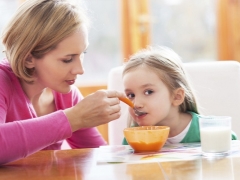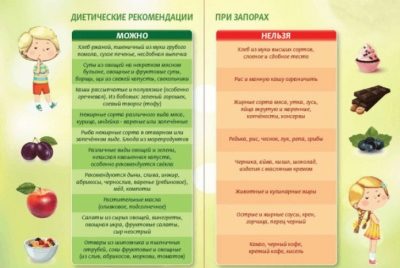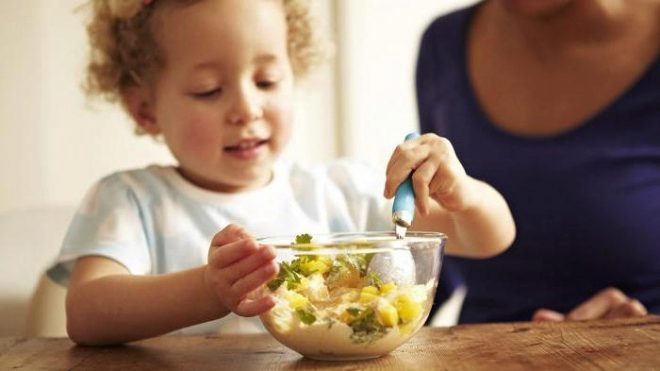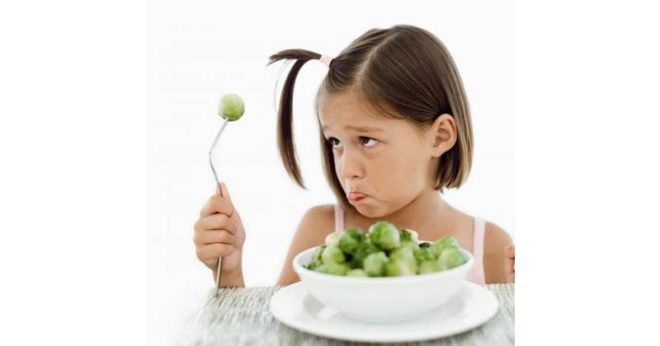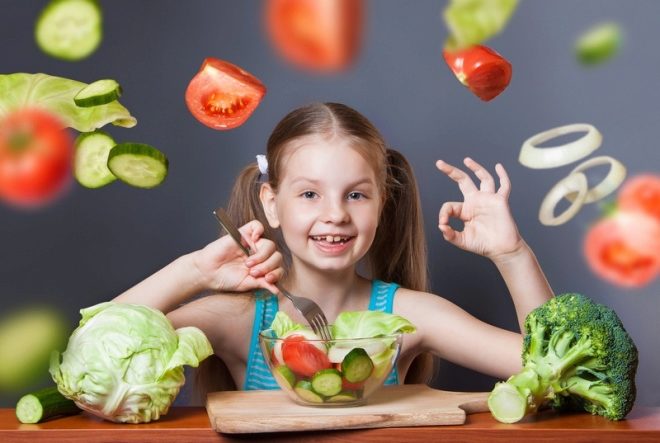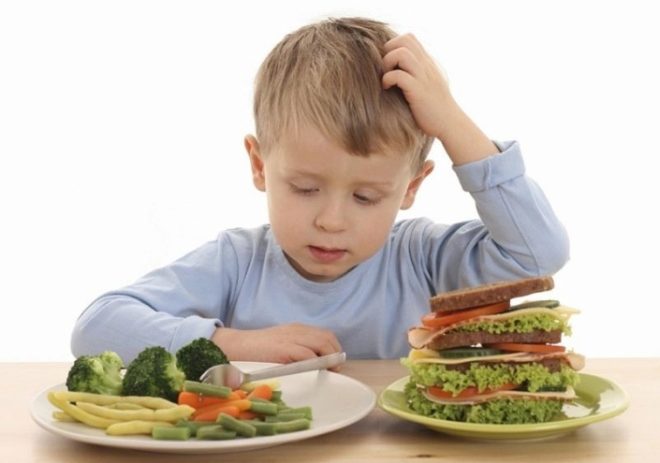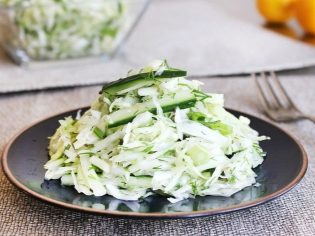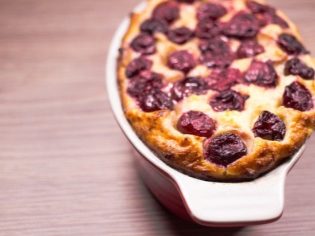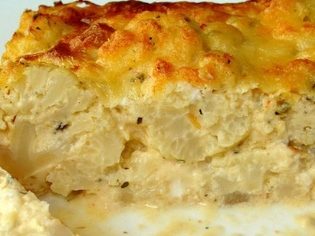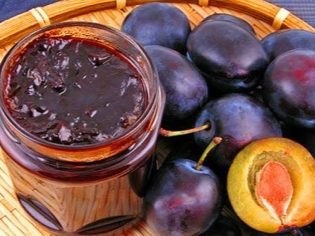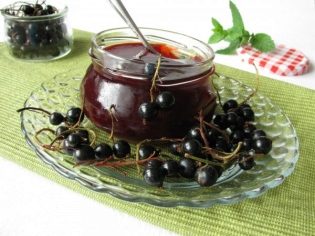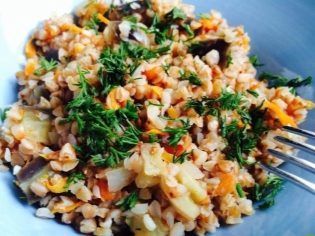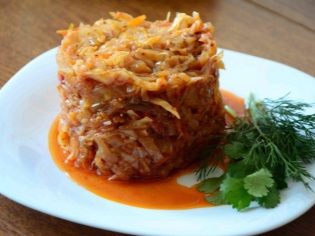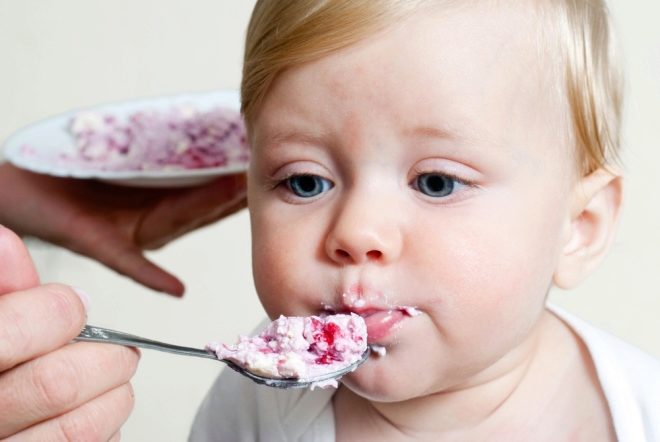Diet for constipation in children
By drafting a diet for a child with chronic constipation should be treated very carefully. In each case, the causes of constipation may vary significantly. Often unbalanced and poor nutrition leads to the appearance of an irregular stool in a child.
Causes
The cause of constipation may not always be associated with diseases of the digestive system. Dr. Komarovsky even believes that the lack of a child’s stool cannot always be interpreted as pathology. Constipation can occur in healthy babies.
Most often it happens in the hot season. When it’s very hot outside, the baby’s body needs a huge amount of water. All the liquid that enters the body crumbs with drinks or fruits, vegetables, is absorbed in the intestines.
If the baby is very active physically, a huge amount of water is lost in the process of sweating. Another part of the body's fluid is lost when breathing. It turns out that the water in summer is not enough.
The function of the large intestine is to ensure that when removing feces from the body as much as possible return all the water inside. After all, the human body is 70% fluid! When the balance between water intake and its loss is disturbed during hot periods, constipation often occurs. In such cases, a strong water imbalance should be avoided. In the summer, let your child drink more (especially if he runs and plays a lot on the street, and also attends sports clubs).
Power Rules
Special medical nutrition allows to correct problems with the delay of the stool in babies. In order for the child to normalize the chair, consider the following rules:
- Follow the feeding regime. At 2 years old, children should eat at least 5 times a day. Diet can not be broken! Timely meals give signals to the intestines to work. All enzymes and hormones with a strict diet begin to stand out harmoniously, strictly at the same time. This allows you to adjust the process of digestion almost on the clock.
- The last time during the day the baby should eat about two hours before bedtime. This will promote good sleep, as well as digestion. During sleep, the digestive system should rest. A hearty dinner shortly before sleep can overload the body and reduce metabolism.
- After waking up, be sure to offer your child to drink half a glass of clean water. This should be plain water without gas at room temperature. Passing through the intestines, the liquid will start its work. This is an excellent prevention of constipation in babies of any age.
- For daily stool drinking mode is very important. A small body needs at least a liter of water per day. In the summer period, the liquid should be more than 300-400 ml (depending on the age of the child).
- Motivate your child to exercise. For children who love games in a team, visiting sports sections is more suitable. Physical activity has a positive effect on the activation of the intestinal motor function. Food passes faster through the gastrointestinal tract, reducing the likelihood of constipation.
- Do not forget about fresh vegetables and fruits. Alternate different vegetables each day to get a variety of vitamins in the body. Add bran to the dishes. Enter them carefully. For children over three years old, ½-1 tsp per day is enough.For babies from one to two years old, it is better to make bran-based decoction.
- Be sure to watch the kid have breakfast. Breakfast starts the body, giving the signal to the organs to wake up. The best choice would be boiled on water porridge or low-fat dairy products. A rich breakfast is absolutely useless for a child.
- Do not overfeed in any way. With a large amount of food the stomach after a while strongly stretches. This provokes the appearance of chronic gastritis. The volume of servings must strictly comply with the age children's norms.
- What products should be included in the children's menu
- It should be remembered that the main key component of any treatment table for constipation is fiber. It is found in all natural herbal products. Leaders in fiber content are fruits, vegetables and cereals.
- Fiber accelerates the movement of food through the gastrointestinal tract and contributes to the timely allocation of feces. It helps prevent the occurrence of malignant tumors and chronic bowel disease. Regular consumption of vegetables will be an excellent means of prevention from ulcerative colitis or Crohn's disease.
In order for the stool to be daily, the following foods should be included in the child’s diet:
- All kinds of cabbage. It can be white, cauliflower, broccoli and Brussels sprouts.
- Berries and fruits. Children with constipation need to eat fruit along with the peel. Of course, first they should be thoroughly washed under running water and rinsed with boiling water. It is in the fruit skin that contains a huge amount of fiber, which will clean the entire intestines of the child gently, without damaging the walls.
- Various vegetables. Children from 6 months to a year should prefer cauliflower or broccoli puree. You can enter mashed potatoes or grated boiled carrots. Older children have already shown extension of the vegetable table. Mom can make casseroles or vegetable stews.
- Baking and bread from flour of the first or second grade. You can use bran bread.
- Raisin, dried apricots, dates and prunes. Babies up to one year are given compotes made from them. Older kids can be offered pre-soaked in boiling water and cooled berries. Prunes perfectly activates the bowels and eliminates constipation.
- Fresh Yogurt. Pay attention to the time of manufacture. Only fresh, freshly cooked dairy products stimulate the intestines. Products cooked more than 5 days ago have the opposite effect. Usually they strongly fix the chair.
Diet number 3
To normalize the stool, the pediatrician usually prescribes a therapeutic diet — diet # 3. This diet can be suitable for both adults and children. It allows you to reduce the putrefactive processes in the intestines and reduce swelling.
What to include in the diet?
The basis of nutrition in this diet are the following products:
- Meat and fish dishes. They should be made from lean meats or fish. It is better to bake or steam. You can cook a variety of dishes from chicken. The skin before cooking must be removed.
- Different fruits or vegetables. Supplementing each meal with a salad of fresh vegetables will help to normalize the bowels.
- All dried fruit, especially prunes.
- Freshly prepared cottage cheese, kefir. Preparation of fermented milk products at home is recommended (using special starter cultures that contain beneficial lactic or bifidobacteria). Such yoghurts or kefir can be prepared every day.
- Cooked porridge. Infants, receiving lures, porridge when cooking is much razvarivat. The consistency should be thin, more like a soup. By the year you can cook porridge is already more dense. An excellent option would be buckwheat porridge, as well as oatmeal.
What products are prohibited?
During the diet number 3 is strictly prohibited:
Fatty, smoked and salted foods. This, for example, pork, duck or lamb.For young children to include in the diet of these products is dangerous! They not only can increase constipation, but also negatively affect the liver and gall bladder.
All pickled and canned products. After heat treatment there is practically no fiber in them, but there are a lot of spices and vinegar.
The child also can not give chocolates, confectionery with fat or butter cream, cakes and pastries.
Sample menu for the week
For successful adherence to any therapeutic diet, doctors recommend making a menu a week in advance. Make a menu on Saturday for the next week. This will allow you on Sunday to buy all the necessary products to start cooking already from Monday. Experiment with products, try to cook different recipes.
What to cook baby for a week, if he has constipation?
Monday
Breakfast: Oatmeal pancakes with raisins. Strawberry mors.
Lunch: Grated pear with prunes. You can fill with a small amount of sour cream or yogurt.
Dinner: Mushroom soup puree. For dessert - a couple of unsweetened crackers and tea.
Tea time: Oven baked cottage cheese pudding with dried apricots. Cocoa on milk.
Dinner: Fishballs in cream sauce with buckwheat. Cabbage salad with cucumber, seasoned with vegetable oil. Blackberry juice.
Tuesday
Breakfast: Cheesecakes with berry sauce. Dried fruits compote.
Lunch: Banana.
Dinner: White fish soup. A slice of bran bread. Unsweetened tea.
Tea time: Wholemeal flour crackers with tea.
Dinner: Vegetable casserole with rice. Kissel.
Wednesday
Breakfast: Oatmeal with prunes and chopped walnuts. For sweets - honey. Cocoa.
Lunch: Grated apple with dried apricots.
Dinner: Soup, cooked in a weak chicken broth. In addition - wholegrain biscuits. Berry compote.
Tea time: Cottage cheese and cherry casserole. Unsweetened tea.
Dinner: Chicken cutlet with cucumber and tomato salad. Dried fruits compote.
Thursday
Breakfast: Oatmeal muesli with milk and dried fruits. Compote of apples and dried apricots.
Lunch: Orange.
Dinner: Chicken soup with vegetables and noodles. Cucumber and grated carrot salad, seasoned with vegetable oil. Unsweetened tea.
Tea time: Banana.
Dinner: Chicken cutlet with mashed potatoes. Vegetable cabbage salad with carrots and herbs. Lingonberry juice.
Friday
Breakfast: Buckwheat pancakes. Cocoa on milk.
Lunch: Fruit salad.
Dinner: Borsch, cooked on lean veal. Carrot salad with raisins. Unsweetened tea.
Tea time: Banana yogurt
Dinner: Cauliflower casserole. Tea with plum jam.
Saturday
Breakfast: Oatmeal fritters with strawberry jam. Unsweetened tea.
Lunch: Wholemeal Cocoa Crackers
Dinner: Soup with vegetables and chicken meatballs. Salad from young cabbage. Compote from prunes.
Tea time: Cottage cheese pudding.
Dinner: Buckwheat with vegetables. Berry Kissel currant.
Sunday
Breakfast: Banana cupcakes with prunes. Unsweetened tea.
Lunch: Apricots
Dinner: Chicken meatballs with boiled buckwheat. Salad of cucumbers and greens. Berry compote.
Tea time: Pear mashed potatoes with crackers.
Dinner: Braised cabbage with chicken cutlet. Sea buckthorn juice
A couple of hours before bedtime, you can give your child any dairy product. Homemade yogurt or kefir is perfect here.
Dieting for children with chronic constipation is an important component of complex treatment. Proper healthy eating with the mandatory inclusion in the menu of foods that stimulate the bowels, will help to make the chair daily and regular.
Recommendations on diet for constipation in a child will tell Dr. Komarovsky in the video below.
